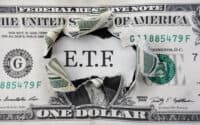
March went out like a lamb, as far as the markets were concerned, with the major indexes retreating from all-time highs. Judging by the most shorted stocks traded on the Nasdaq, short sellers seemed cautious overall. Moves in those shorted stocks were mostly negative between the March 15 and March 31 settlement dates.
The only notable gainer in that time was a biopharma stock that was new to this list, lifted by a double-digit percentage gain in the number of its shares short. It bumped another specialty pharma stock out of the top six.
Note that still only three Nasdaq stocks had more than 100 million shares short, as of the end of last month. However, two of them remain very far ahead of the pack.
Sirius XM
The approximately 261.72 million Sirius XM Holdings Inc. (NASDAQ: SIRI) shares short by the end of March was more than 5% lower than on the previous settlement date. That was the second period in a row that the number of shares short shrank, and it was 17.0% of the float. At the most recent average daily volume, it would take more than 11 days to cover all short positions.
Barclays downgraded Sirius during the period. The stock ended the two weeks almost 3% lower, though it was up more than 1% at one point. The Nasdaq rose less than 1% between the settlement dates. The stock is currently trading more than 13% higher year to date. It closed Tuesday at $5.06 a share, in a 52-week trading range of $3.74 to $5.53.
Frontier Communications
After rising modestly in the previous three periods, the number of shares short in Frontier Communications Corp. (NASDAQ: FTR) pulled back almost 8% more to almost 252.08 million as of the most recent settlement date. That was 21.6% of the telecom’s float, as well as the 15th consecutive period with more than 200 million shares short. The daily average volume rose sharply again, and the days to cover dropped from around five to about three.
There have been concerns about whether Frontier can maintain its dividend. The share price was down around 11% by the end of the month. The stock has continued to fall since then, and it hit a 52-week low of $1.92 last month. The 52-week high of $5.75 was seen almost a year ago. The stock closed most recently at $2.05 a share.
AMD
By the end of March, Advanced Micro Devices Inc. (NASDAQ: AMD) had almost 111.32 million shares short. That was a decline of about 3% from the total on the previous settlement date, and it was 13.4% of the company’s float. Note that short interest had grown in six of the past seven periods. It still would take less than two days to cover all short positions.
AMD was among the Jefferies top semiconductor picks during the period, and the March 31 share price was about 4% higher than on the previous settlement date, though it was down more than 3% at one point. The stock closed at $13.10 on Tuesday, more than 15% higher year to date. Shares have changed hands at between $2.60 and $15.55 in the past year.
Intel
Almost 93.26 91.82 million Intel Corp. (NASDAQ: INTC) shares were sold short as of the most recent settlement date. Short interest grew less than 2% during the period to total 2.0% of the company’s float. Note that was the greatest number of shares short in at least a year. As of the end of March, it would take more than four days to cover all short positions.
Intel has a particularly good reputation in the United Kingdom, recent research shows, and its share price ended the short interest period less than 3% higher. It has pulled back a little since and is now down less than 2% since the beginning of the year. The most recent close at $35.74 a share compares to a 52-week trading range of $29.50 and $38.45.
Opko Health
Opko Health Inc.’s (NASDAQ: OPK) short interest of more than 73.83 million shares on the most recent settlement date was up only fractionally from the previous period. And it was 22.0% of the total float, as well as the fifth consecutive period with more than 70 million shares short. The daily average volume retreated from a year-to-date high, so the days to cover rose from more than 10 to almost 18.
For well more than a year, the CEO frequently has bought batches of Opko shares. The stock closed most recently at $7.55 a share, in a 52-week trading range of $7.13 to $12.15. The share price ended the two-week short-interest period around 1% lower, though it was down more than 5% at one point. The stock is now down almost 19% since the beginning of the year.
Synergy Pharmaceuticals
Short interest at Synergy Pharmaceuticals Inc. (NASDAQ: SGYP) totaled more than 62.12 million shares on March 31, or up more than 32% from the prior settlement date. That was more than double the number of shares short at the beginning of the year, and it was a whopping 28.9% of the total float. The days to cover slipped from almost 10 to less than seven during the period.
This biopharmaceutical company is focused on treatments for constipation and irritable bowel syndrome. Short sellers watched the stock sink more than 11% during those two weeks. The share price retreated more afterward and closed most recently at $4.41, which is down more than 27% since the beginning of the year. The 52-week trading range is $2.62 to $7.15.
And Others
Rounding out the top 10 were Novavax Inc. (NASDAQ: NVAX), Yahoo! Inc. (NASDAQ: YHOO), Comcast Corp. (NASDAQ: CMCSA) and BlackBerry Ltd. (NASDAQ: BBRY). The double-digit short interest decline in Novavax helped it to fall out of the top six. Yahoo was the only one of these to see a gain in the number of shares short.
Apple Inc. (NASDAQ: AAPL) and Groupon Inc. (NASDAQ: GRPN) lingered just beyond the top 10 most shorted Nasdaq stocks, despite handy decreases in their short interest. Cypress Semiconductor Corp. (NASDAQ: CY) also bucked the trend with a strong rise in the number of its shares short, but not enough to lift it into the top 10.
The #1 Thing to Do Before You Claim Social Security (Sponsor)
Choosing the right (or wrong) time to claim Social Security can dramatically change your retirement. So, before making one of the biggest decisions of your financial life, it’s a smart idea to get an extra set of eyes on your complete financial situation.
A financial advisor can help you decide the right Social Security option for you and your family. Finding a qualified financial advisor doesn’t have to be hard. SmartAsset’s free tool matches you with up to three financial advisors who serve your area, and you can interview your advisor matches at no cost to decide which one is right for you.
Click here to match with up to 3 financial pros who would be excited to help you optimize your Social Security outcomes.
Have questions about retirement or personal finance? Email us at [email protected]!
By emailing your questions to 24/7 Wall St., you agree to have them published anonymously on a673b.bigscoots-temp.com.
By submitting your story, you understand and agree that we may use your story, or versions of it, in all media and platforms, including via third parties.
Thank you for reading! Have some feedback for us?
Contact the 24/7 Wall St. editorial team.
 24/7 Wall St.
24/7 Wall St.


